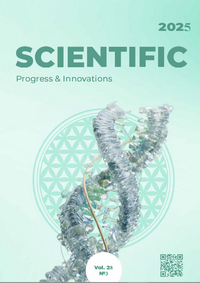The peculiarities of agglutinins’ activity in male and female plants of Ginkgo biloba (Ginkgo biloba L.)
DOI:
https://doi.org/10.31210/spi2025.28.03.11Keywords:
Ginkgo biloba, lectins, proteins, agglutination, sexualization of treesAbstract
Lectins, or hemagglutinins, are protein compounds that are capable of selectively and reversibly binding carbohydrates without their chemical transformation, exhibiting the property of agglutinating cells and particles. Owing to their different functions, they have significant theoretical and applied importance in biology and medicine, which makes the search for new sources of these substances topical. Ginkgo biloba (Ginkgo biloba L.), the only modern representative of Ginkgopsida class, is known for its rich phytochemical composition, which determines the use of its raw materials in the pharmaceutical industry. The purpose of the study was to determine the pH profile of phytohemagglutinins’ activity in cone berries, buds, leaves and one-year shoots of female and male ginkgo trees. The objects were the samples collected from plantings in Poltava. The study was conducted using the standard method for assessing the degree of human hemagglutination. The accumulated experimental data showed that agglutinins were present in all the studied plant organs however their activity varied significantly depending on the tissue and sex of the trees. In cone berries, the maximum activity was recorded in the pedicle and collar, while in seeds proteins were concentrated mainly in the sclerotesta. The vegetative organs also showed sexual differentiation: in female trees, the lectins’ activity in the buds, shoots, and especially in the leaves was significantly higher than in male trees. At the same time, in the leaf blades of female trees, the level of hemagglutination in the pH range of 6.0–8.0 reached 12.3 points, while in male trees it did not exceed 6.5 points. The most pronounced differences were observed in the alkaline pH zone, where the activity reached the maximum values. The obtained results confirm the new fact for the science – the presence of agglutinins in Ginkgo biloba L. and their different localization depending on the organ and sex of the plant. The revealed conformities to the laws of nature may have practical significance as marker traits for identifying female and male plants in the pre-reproductive period of ontogenesis, which is promising for pharmacognostic and biotechnological research.
Downloads
Published
How to Cite
Issue
Section
License
Copyright (c) 2025 Scientific Progress & Innovations

This work is licensed under a Creative Commons Attribution 4.0 International License.

 Creative Commons Attribution 4.0 International Licens
Creative Commons Attribution 4.0 International Licens